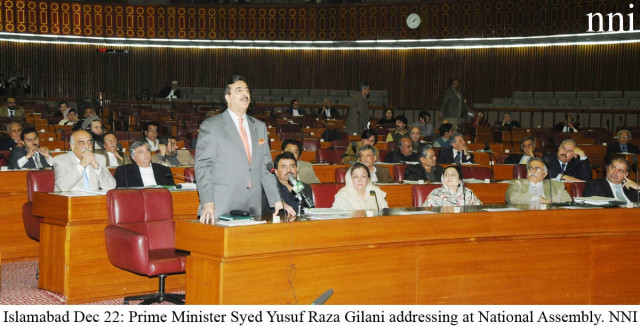Hear hear, Mr Prime Minister
Prime Minister said many of the things that need to be said at this stage, by the country’s elected chief executive.

Of course, it doesn’t help this government in particular, in that its record on governance and delivering public services to citizens is most inadequate. However, the issue in question is not the performance of the present government per se, but rather that of which institution is supreme according to the country’s Constitution, and whether the powerful military is to be subordinate to parliament. Since the latter represents the popular will of the people, as manifest through the holding of general elections, it necessarily follows that the parliament be sovereign in its role as the nation’s supreme decision-making body, and all other institutions of state be answerable/accountable to it. The reality is otherwise as many of us know. The establishment is in charge of large sections of foreign policy and in many instances also calls the shots with regards to domestic policy. It has appropriated to itself the states policies towards important matters such as ties with America, with India and the country’s participation in the war on terror and the fight against domestic militancy and extremism. What is being advocated is not exactly heretical or extraordinary. It happens, by and large, next-door in India, where an elected civilian government, albeit with allegations of corruption and a tainted public image, has a military that is subordinate to it. The reason that India never had a military coup is because its civilian leaders asserted themselves and the country held regular elections. Parties contested them, the winners making a government, and if they did badly and failed to deliver, the people voted them out at the next election. This, indeed, is how things are done in a mature democracy, something Pakistan can, for now, only aspire to.
In this context, Prime Minister Gilani’s remarks make eminent sense and should be welcomed by all those who want to see the country as a state that operates as a fully functional democracy and not one where the military dominates all other institutions, and where policies formulated by the establishment guide the nation. It goes without saying that in a democracy, all institutions of the state are answerable and hence subservient to parliament. This stand should have been taken by the PPP, which has fought several dictatorships in the past, in the first place, but better late than never. While the prime minister rightly made a strong case for the government to be allowed to complete its term, he did say that the military was “disciplined” and that it “followed the Constitution”. This is also welcome because it does not make for a blame-game and in fact, suggests an attempt by him to assuage the powerful institution, while at the same time clearly saying that whatever is happening will not be taken lying down by the PPP-led government.
Published in The Express Tribune, December 23rd, 2011.















COMMENTS
Comments are moderated and generally will be posted if they are on-topic and not abusive.
For more information, please see our Comments FAQ